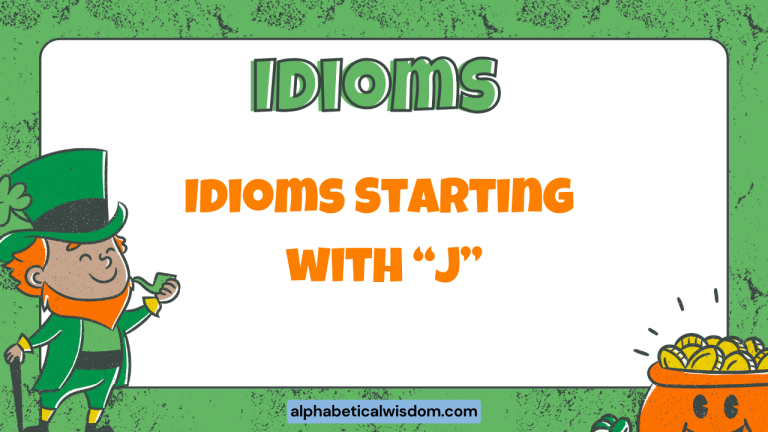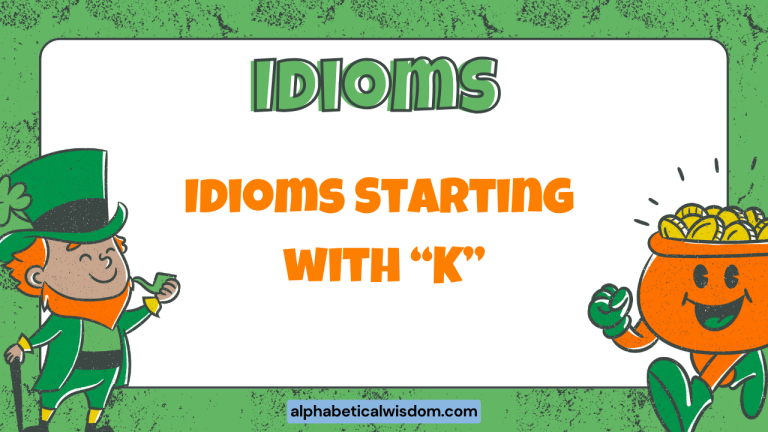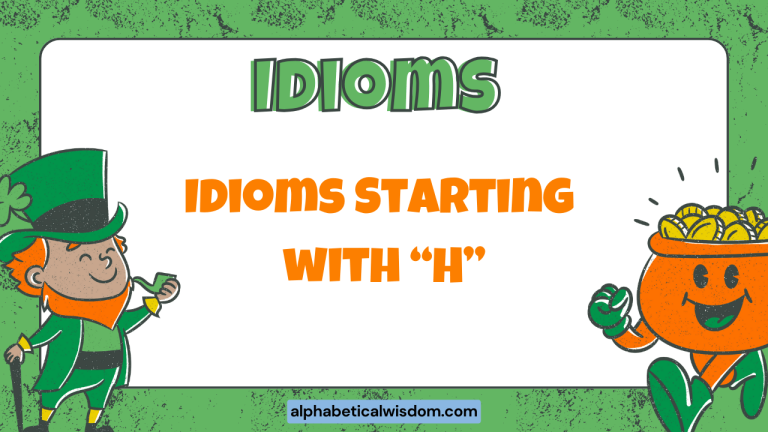Idioms Starting with ‘E’: Mastering English Expressions
Idioms enrich the English language, adding color and depth to everyday conversations and written texts. Understanding idioms, particularly those starting with the letter ‘E,’ is crucial for both comprehension and fluency.
This article provides a comprehensive guide to common idioms beginning with ‘E,’ offering definitions, examples, usage rules, and practice exercises. This resource is perfect for English language learners, ESL/EFL students, and anyone looking to enhance their grasp of idiomatic expressions.
By mastering these idioms, learners can improve their reading comprehension, listening skills, and ability to express themselves more naturally and effectively. The structured approach, with detailed explanations and practical examples, ensures that even complex idioms become accessible and understandable.
Let’s dive in and explore the fascinating world of ‘E’ idioms!
Table of Contents
- Definition of Idioms
- Structural Breakdown of Idioms
- Types and Categories of ‘E’ Idioms
- Examples of Idioms Starting with ‘E’
- Usage Rules for ‘E’ Idioms
- Common Mistakes with ‘E’ Idioms
- Practice Exercises
- Advanced Topics in Idiom Usage
- Frequently Asked Questions
- Conclusion
Definition of Idioms
An idiom is a phrase or expression whose meaning cannot be understood from the literal meanings of its individual words. Instead, it has a figurative meaning that is known through common usage.
Idioms are culture-specific and often vary significantly between languages, making them a challenging but rewarding aspect of language learning.
Idioms can be classified as figurative language, where the words are used in a non-literal sense to create a particular effect. They function as single units of meaning within a sentence, adding nuance, humor, or emphasis. The context in which an idiom is used is crucial for understanding its intended meaning. Without the proper context, the idiom may be misinterpreted, leading to confusion.
In essence, idioms are a shortcut to expressing complex ideas or emotions in a concise and colorful way. Mastering idioms allows for more natural and fluent communication, as well as a deeper understanding of the cultural background of the language.
Structural Breakdown of Idioms
Idioms, although seemingly arbitrary, often follow certain structural patterns. Understanding these patterns can aid in recognizing and interpreting new idioms.
Some common structures include:
- Verb + Preposition: Many idioms consist of a verb followed by a preposition, such as “eat out” or “end up.”
- Verb + Adverb: Similar to the above, some idioms combine a verb with an adverb, like “ease off” or “edge out.”
- Noun + Verb: Occasionally, idioms are formed with a noun and a verb, such as “elbow grease” (meaning hard work).
- Fixed Phrases: Some idioms are fixed phrases that don’t follow a typical grammatical structure, such as “every now and then” or “easy come, easy go.”
The meaning of an idiom is generally not predictable from its individual components. For example, “eat humble pie” doesn’t literally involve eating pie, but rather means to admit one’s error and apologize humbly.
The idiomatic meaning is derived from the cultural context and historical usage of the phrase.
It’s important to note that while some idioms may have similar structures, their meanings can be vastly different. Therefore, learning idioms requires memorization and contextual understanding rather than relying solely on grammatical analysis.
Types and Categories of ‘E’ Idioms
Idioms starting with ‘E’ can be categorized based on their thematic content or the type of situation they describe. Here are some common categories:
1. Idioms Related to Effort and Achievement
These idioms describe the level of effort required to accomplish something or the outcome of such effort.
2. Idioms Describing Emotional States
This category includes idioms that express various emotions, such as happiness, sadness, anger, or fear.
3. Idioms Referring to Time and Timing
These idioms relate to specific moments in time, deadlines, or the duration of an event.
4. Idioms About Avoiding or Facing Problems
This set of idioms deals with strategies for dealing with difficult situations or challenges.
5. Idioms Involving Exaggeration or Understatement
These idioms play with the scale of a situation to create a particular effect, either emphasizing or minimizing its importance.
Examples of Idioms Starting with ‘E’
This section provides a comprehensive list of idioms starting with ‘E,’ categorized by their general meaning. Each idiom is accompanied by a definition and example sentence.
Table 1: Idioms Related to Effort and Achievement
The table below showcases idioms that describe the level of effort required or the outcome of such effort. Understanding these idioms can help you express ideas related to hard work, success, and perseverance.
| Idiom | Definition | Example Sentence |
|---|---|---|
| Earn a living | To make enough money to support oneself. | He earns a living by working as a software developer. |
| Ease off | To reduce in intensity or effort. | The rain started to ease off after a few hours. |
| Eat your heart out | To be envious or jealous of someone’s success. | Eat your heart out, critics! The movie was a huge success. |
| Egg someone on | To encourage someone to do something risky or foolish. | His friends egged him on to jump off the bridge. |
| Elbow grease | Hard physical work. | It took a lot of elbow grease to clean the old car. |
| Every trick in the book | To use every possible method to achieve something, often dishonestly. | The lawyer used every trick in the book to win the case. |
| Excel oneself | To do better than one has ever done before. | She excelled herself in the final exam, scoring the highest grade. |
| Extra mile | To do more than what is expected. | He always goes the extra mile to help his colleagues. |
| Eyes bigger than your stomach | To take more food than one can eat. | He had eyes bigger than his stomach and couldn’t finish his plate. |
| Eagle eye | Having sharp and keen eyesight; being observant. | The security guard has an eagle eye and notices everything. |
| Early bird catches the worm | The person who arrives first has the best chance of success. | I got to the store early; the early bird catches the worm. |
| Easy as pie | Very easy to do. | The test was easy as pie. |
| Easy come, easy go | Something gained easily is also lost easily. | He won the lottery, but spent it all quickly; easy come, easy go. |
| Eat crow | To admit that you were wrong, especially in a humiliating way. | He had to eat crow after predicting the team would lose. |
| Eat out of house and home | To eat a lot of someone’s food, costing them a lot of money. | With three growing boys, they were eating us out of house and home. |
| End of the line | The point at which something can no longer continue. | For that company, this project was the end of the line. |
| Even playing field | A situation in which everyone has the same opportunities. | We need to create an even playing field for all students. |
| Every cloud has a silver lining | Every bad situation has some good aspect to it. | Although she lost her job, every cloud has a silver lining; she now has time to pursue her hobbies. |
| Every dog has its day | Everyone will have their moment of success or good fortune. | Don’t worry, every dog has its day. |
| Eye-opener | Something that surprises you and teaches you new facts about life. | Visiting the homeless shelter was a real eye-opener. |
| Egg on your face | To look foolish or embarrassed because of something you have done. | He had egg on his face after his prediction turned out to be wrong. |
| Entertain the idea | To consider a possibility. | I am willing to entertain the idea of changing careers. |
Table 2: Idioms Describing Emotional States
The following table presents idioms that express different emotions. Understanding these idioms will help you describe feelings such as happiness, sadness, anger, or fear in a more nuanced and vivid way.
| Idiom | Definition | Example Sentence |
|---|---|---|
| Eager beaver | A person who is very enthusiastic and hardworking. | She’s such an eager beaver, always volunteering for extra tasks. |
| Emotionally drained | Feeling exhausted due to emotional stress. | After the long day, she felt completely emotionally drained. |
| Enough is enough | A point at which one can no longer tolerate something. | Enough is enough! I can’t take any more of your complaints. |
| Escape artist | Someone skilled at avoiding difficult situations. | He’s a real escape artist when it comes to doing chores. |
| Every nerve on edge | Feeling extremely nervous or anxious. | The suspenseful movie had me with every nerve on edge. |
| Ecstatic with joy | Overwhelmed with happiness. | She was ecstatic with joy when she heard the good news. |
| Embrace the moment | To fully enjoy and appreciate the present. | We should embrace the moment and not worry about the future. |
| Encourage someone’s heart | To give someone hope or confidence. | Her kind words encouraged my heart and helped me through a tough time. |
| Enjoy life to the fullest | To live life with enthusiasm and appreciation. | He always tries to enjoy life to the fullest. |
| Enter into the spirit of | To happily join in with something. | We all entered into the spirit of the holiday season. |
| Even keel | A stable and balanced state, especially emotionally. | She managed to keep an even keel despite the challenges. |
| Everything but the kitchen sink | To include everything possible, even unnecessary items. | They packed everything but the kitchen sink for their vacation. |
| Exaggerate the truth | To describe something as larger or greater than it really is. | He tends to exaggerate the truth when telling stories. |
| Exhibit patience | To show patience. | She exhibited patience while waiting in the long line. |
| Exhaust every avenue | To try every possible way to achieve something. | We need to exhaust every avenue before giving up. |
| Express gratitude | To show thanks. | I wanted to express my gratitude for your help. |
| Extinguish a hope | To destroy a hope. | His words extinguished her hope of reconciliation. |
| Eye candy | Something visually attractive but often lacking substance. | The movie was just eye candy with no real plot. |
| Eyes light up | To show great excitement or pleasure. | Her eyes lit up when she saw the surprise gift. |
| Ears are burning | Said when you suspect someone is talking about you. | My ears are burning; I wonder if someone is talking about me. |
Table 3: Idioms Referring to Time and Timing
This table focuses on idioms that relate to time, timing, and deadlines. Understanding these expressions can improve your ability to discuss schedules, punctuality, and the duration of events.
Early to bed, early to riseA proverb about the benefits of going to bed and waking up early.He follows the rule of early to bed, early to rise, and is always productive.Endure to the endTo persevere until the final moment.We must endure to the end to achieve our goals.Eon awayA very long time.It feels like an eon away since we last met.Evening starVenus, when visible in the evening sky.The evening star shone brightly in the twilight.
| Idiom | Definition | Example Sentence |
|---|---|---|
| Early on | At an early stage or time. | Early on in the project, we faced several challenges. |
| Every now and then | Occasionally; from time to time. | Every now and then, I like to visit my hometown. |
| End of the road | The final point; the conclusion. | For him, losing the election was the end of the road for his political career. |
| Elapsed time | The amount of time that has passed. | The elapsed time for the race was two hours and thirty minutes. |
| Eternal flame | Something that is never-ending. | Their love was an eternal flame. |
| Evening of one’s life | The later years of someone’s life. | In the evening of his life, he enjoyed spending time with his grandchildren. |
| Every single day | Without exception; each day. | I practice the piano every single day. |
| Every other day | On alternate days. | I go to the gym every other day. |
| End of an era | The conclusion of a significant period in history or someone’s life. | The retirement of the CEO marked the end of an era for the company. |
| Ephemeral moment | A brief and fleeting moment. | The beauty of the sunset was an ephemeral moment. |
| Endure the test of time | To remain popular or effective over a long period. | Classic literature continues to endure the test of time. |
| Eternally grateful | To be forever thankful. | I am eternally grateful for your kindness. |
| Evening primrose | A flower that blooms in the evening. | The garden was filled with the scent of evening primrose. |
| Every minute counts | Each moment is important. | In a crisis, every minute counts. |
| Evergreen | Remaining fresh or relevant for a long time. | That song is an evergreen classic. |
| Eventful day | A day full of significant or interesting events. | Today has been a very eventful day. |
Table 4: Idioms About Avoiding or Facing Problems
The following table lists idioms related to dealing with problems, challenges, and difficult situations. These idioms can help you express strategies for avoiding, confronting, or resolving issues.
| Idiom | Definition | Example Sentence |
|---|---|---|
| Escape from reality | To avoid dealing with problems by engaging in fantasy or entertainment. | She likes to escape from reality by reading novels. |
| Easy way out | The simplest or least challenging way to solve a problem. | He took the easy way out by quitting instead of facing his challenges. |
| Elephant in the room | An obvious problem or issue that no one wants to discuss. | His drinking problem was the elephant in the room during the family gathering. |
| Err on the side of caution | To be more careful than necessary. | We should err on the side of caution and double-check the data. |
| Every man for himself | A situation in which everyone must look after their own interests. | When the fire alarm rang, it was every man for himself. |
| Excuses are a dime a dozen | Excuses are easy to find and not valuable. | Excuses are a dime a dozen; what matters is taking responsibility. |
| Explore all options | To consider every possible solution. | We need to explore all options before making a decision. |
| Extricate oneself from | To free oneself from a difficult situation. | He managed to extricate himself from the debt. |
| Empty threat | A threat that is not likely to be carried out. | His threats were just an empty threat. |
| Evasive action | Action taken to avoid something dangerous or undesirable. | The pilot took evasive action to avoid the storm. |
| Expose a lie | To reveal that something is not true. | The investigation exposed the lie. |
| Elude capture | To avoid being caught. | The thief managed to elude capture. |
| Emotional baggage | Past emotional issues that affect someone’s current behavior. | He carried a lot of emotional baggage from his childhood. |
| Encounter resistance | To face opposition. | The new law encountered resistance from the public. |
| Enter into conflict | To become involved in a disagreement or fight. | We should try to avoid entering into conflict. |
| Evaluate the risks | To assess the potential dangers. | We need to evaluate the risks before proceeding. |
| Evade the question | To avoid answering a question directly. | He tried to evade the question by changing the subject. |
| Exclude the possibility | To rule out a certain option. | We can’t exclude the possibility of further delays. |
| Exercise caution | To be careful. | You should exercise caution when dealing with strangers. |
| Eye of the storm | A brief period of calm during a turbulent situation. | They found peace in the eye of the storm. |
Table 5: Idioms Involving Exaggeration or Understatement
This final table includes idioms that use exaggeration or understatement to create a specific effect. Understanding these expressions will help you appreciate the nuances of language and add emphasis or humor to your communication.
| Idiom | Definition | Example Sentence |
|---|---|---|
| Every Tom, Dick, and Harry | An ordinary or common person. | Every Tom, Dick, and Harry thinks they can be a politician. |
| Exaggerate beyond belief | To greatly overstate something. | He tends to exaggerate beyond belief when telling stories. |
| Enough to make a grown man cry | Extremely sad or frustrating. | The situation was enough to make a grown man cry. |
| Everything under the sun | Everything imaginable. | They sell everything under the sun at that store. |
| Exceedingly rare | Very uncommon. | That type of bird is exceedingly rare in this region. |
| Extremely difficult | Very hard to do. | The task was extremely difficult. |
| Endless possibilities | Unlimited opportunities. | There are endless possibilities for your future. |
| Excessive amount | Too much of something. | He consumed an excessive amount of sugar. |
| Exceptionally talented | Remarkably skilled. | She is an exceptionally talented musician. |
| Entirely different | Completely dissimilar. | The two approaches are entirely different. |
| Easier said than done | More difficult to do than to say. | Quitting smoking is easier said than done. |
| Every little bit helps | Even a small contribution can be useful. | Every little bit helps when raising money for charity. |
| Expansive range | A wide variety. | The store offers an expansive range of products. |
| Extremely important | Very significant. | This meeting is extremely important. |
| Every nook and cranny | Every part of a place. | We searched every nook and cranny. |
| Eye-popping | Astonishing or surprising. | The special effects were eye-popping. |
| Exorbitant price | An unreasonably high price. | They charged an exorbitant price for the tickets. |
| Exceptionally beautiful | Remarkably attractive. | She is an exceptionally beautiful woman. |
| Endless supply | A never-ending amount. | They seem to have an endless supply of energy. |
| Entirely possible | Completely feasible. | It’s entirely possible that he will win. |
Usage Rules for ‘E’ Idioms
Using idioms correctly requires understanding their specific meanings and contexts. Here are some general rules to follow when using idioms starting with ‘E’:
- Context is Key: Always consider the context in which you are using the idiom. The same idiom can have different meanings in different situations.
- Word Order: Idioms are fixed expressions, so the word order should not be changed. Altering the word order can change the meaning or make the idiom nonsensical.
- Tense and Agreement: Adjust the tense and agreement of the idiom to match the rest of the sentence. For example, “He eats humble pie” can become “He ate humble pie” or “He is eating humble pie.”
- Audience Awareness: Be mindful of your audience. Some idioms are more formal than others, and some may not be familiar to non-native speakers.
- Overuse: Avoid overusing idioms, as it can make your language sound unnatural or forced. Use them sparingly to add emphasis or color to your speech.
It’s also important to be aware of regional variations in idiom usage. Some idioms may be more common in certain dialects of English than others.
When in doubt, it’s always best to err on the side of clarity and avoid using unfamiliar idioms.
Common Mistakes with ‘E’ Idioms
One of the most common mistakes with idioms is taking them literally. Because idioms have figurative meanings, interpreting them word-for-word can lead to confusion or miscommunication.
Here are some examples of common mistakes and how to correct them:
| Incorrect | Correct | Explanation |
|---|---|---|
| He ate a literal humble pie. | He ate humble pie. | “Eat humble pie” means to admit one’s error, not literally consume a pie. |
| She is eagering beaver. | She is an eager beaver. | “Eager beaver” is a fixed expression and requires the article “an.” |
| Every now or then. | Every now and then. | The correct idiom is “every now and then,” not “every now or then.” |
| The elephant was in the room. | The elephant in the room. | The definite article “the” is required before “elephant.” |
| He’s escaping from the reality. | He’s escaping from reality. | The definite article “the” is not needed before “reality.” |
Another common mistake is using the wrong form of the idiom. For example, using “every dog has its day” as “every cat has its day” changes the meaning and makes the idiom incorrect.
Always double-check the correct wording of the idiom before using it.
Practice Exercises
Test your understanding of idioms starting with ‘E’ with these practice exercises. Choose the correct idiom to complete each sentence.
Exercise 1: Fill in the Blanks
Complete the following sentences with the correct idiom from the list provided.
- After losing the game, he had to __________. (eat crow, egg someone on, earn a living)
- She __________ by working as a teacher. (eat crow, egg someone on, earn a living)
- His friends __________ to jump off the bridge. (eat crow, egg someone on, earn a living)
- The project was __________, but we managed to finish it on time. (easy as pie, extremely difficult, every now and then)
- I visit my grandparents __________. (easy as pie, extremely difficult, every now and then)
- The test was __________. I finished it in just 10 minutes! (easy as pie, extremely difficult, every now and then)
- She always goes the __________ to help her colleagues. (easy way out, extra mile, empty threat)
- He took the __________ by quitting instead of facing his challenges. (easy way out, extra mile, empty threat)
- His threats were just an __________. (easy way out, extra mile, empty threat)
- We need to __________ before making a decision. (escape from reality, explore all options, empty threat)
Answer Key:
- eat crow
- earn a living
- egged him on
- extremely difficult
- every now and then
- easy as pie
- extra mile
- easy way out
- empty threat
- explore all options
Exercise 2: Multiple Choice
Choose the best definition for the following idioms.
- What does “elephant in the room” mean?
- A literal elephant in a room.
- An obvious problem that no one wants to discuss.
- A hidden secret.
- What does “every cloud has a silver lining” mean?
- All clouds are silver.
- Every bad situation has some good aspect to it.
- Clouds are always a sign of good luck.
- What does “eyes bigger than your stomach” mean?
- Having large eyes.
- Taking more food than one can eat.
- Being greedy.
- What does “easy come, easy go” mean?
- Something gained easily is also lost easily.
- Life is easy.
- Come and go as you please.
- What does “end of the line” mean?
- The final stop on a train.
- The point at which something can no longer continue.
- A straight line.
Answer Key:
- b
- b
- b
- a
- b
Advanced Topics in Idiom Usage
For advanced learners, understanding the nuances and origins of idioms can further enhance their language skills. Here are some advanced topics to explore:
- Etymology: Researching the origins of idioms can provide insights into their meanings and cultural significance. Many idioms have historical or literary roots.
- Regional Variations: Explore how idioms vary across different English-speaking regions. Some idioms are specific to certain countries or dialects.
- Idioms in Literature: Analyze how idioms are used in literature to create vivid imagery, develop characters, and convey themes.
- Creating New Idioms: While most idioms are established expressions, advanced speakers can sometimes create new idioms by playing with language and context. However, this should be done with caution and awareness of the audience.
By delving into these advanced topics, learners can gain a deeper appreciation for the richness and complexity of the English language.
Frequently Asked Questions
- What is the difference between an idiom and a proverb?An idiom is a phrase whose meaning is different from the literal meaning of its individual words, while a proverb is a short, well-known saying that expresses a general truth or piece of advice. For example, “break a leg” is an idiom meaning “good luck,” while “a penny saved is a penny earned” is a proverb offering financial advice. Idioms are more about figurative language, whereas proverbs offer wisdom or guidance.
- How can I effectively learn and remember idioms?To effectively learn and remember idioms, try using them in context, creating flashcards with definitions and examples, and practicing them in conversation. Also, expose yourself to English media like movies, TV shows, and books, where idioms are commonly used. Review idioms regularly to reinforce your memory.
- Are idioms universal across all languages?No, idioms are not universal. They are culture-specific and often do not translate directly between languages. While some languages may have similar expressions, the specific wording and cultural context can vary significantly. This is why idioms can be challenging for language learners.
- Is it okay to mix idioms from different languages?Generally, it is not advisable to mix idioms from different languages, as this can lead to confusion and miscommunication. Idioms are deeply rooted in their respective cultures, and combining them can create nonsensical or humorous, but ultimately unclear, expressions.
- Where can I find resources to learn more idioms?There are many resources available for learning idioms, including online dictionaries, language learning apps, textbooks, and websites dedicated to idiomatic expressions. Additionally, reading English literature and watching English-language media can expose you to a wide range of idioms in context.
Conclusion
Mastering idioms starting with the letter ‘E’ is a valuable step toward achieving fluency and a deeper understanding of the English language. By studying the definitions, usage rules, and examples provided in this article, learners can enhance their communication skills and express themselves more naturally and effectively.
Remember to practice regularly and be mindful of context to avoid common mistakes. With dedication and effort, you can confidently incorporate ‘E’ idioms into your everyday conversations and written work, adding color and depth to your language.






